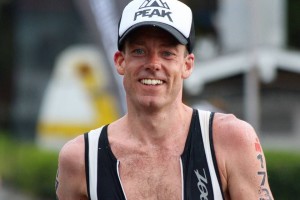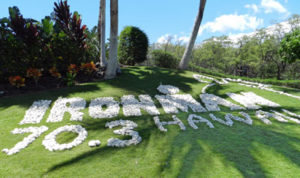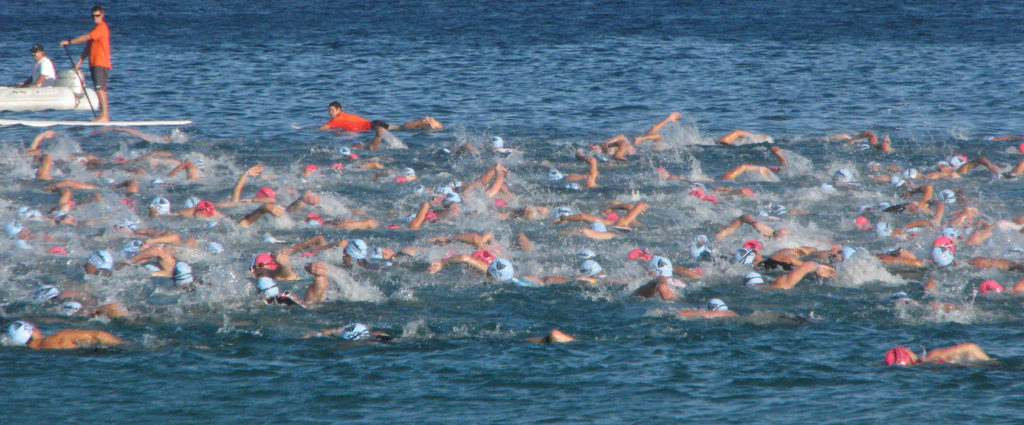Pacific Quest is supporting Mike Sullivan in his 2016 race and triathlon training. In this series of posts, Mike will share insights and perspectives throughout his races and training, and drawing parallels between the mind-body connection and wellness – important themes at Pacific Quest Wilderness Program. In his first two posts, Mike shared his insights before and after the Hilo Marathon. Mike parallels navigating transitions in racing, wilderness therapy, and life in his third post. Today he looks at acceptance, on and off the course.
By: Mike Sullivan, MA, LMHC
Alumni and Family Services Director
I recall a Pacific Quest student highlighting pertinent lessons from the book The Knight in Rusty Armor – “Mike, the most important theme of the book revolves around acceptance. See, right here, it says ‘accept; don’t expect.’ This is a critical message for me at this point in my life.” And later that day, the student painted a rock with the message “Accept; don’t expect,” and placed it carefully as a centerpiece in a garden bed.
 The past two months have largely been hallmarked by acceptance, particularly as it applies to triathlon and life. I awoke before the sunrise on Thursday, May 5th, eager to learn my fate related to competing in the 2016 Kona Ironman World Championship. A quick glance at the newspaper revealed that my name was not one of 24 lucky island residents selected through a random lottery system. Although somewhat disappointed, I had practiced the art of keeping my expectations realistic, and not placing too much emotional investment in the outcome of a lottery I had no control over. I sighed, moped around the house for twenty minutes, honored how fortunate I was to race in 2015, and set my sights on other challenging races I had approaching on the 2016 race calendar. Accept and move on.
The past two months have largely been hallmarked by acceptance, particularly as it applies to triathlon and life. I awoke before the sunrise on Thursday, May 5th, eager to learn my fate related to competing in the 2016 Kona Ironman World Championship. A quick glance at the newspaper revealed that my name was not one of 24 lucky island residents selected through a random lottery system. Although somewhat disappointed, I had practiced the art of keeping my expectations realistic, and not placing too much emotional investment in the outcome of a lottery I had no control over. I sighed, moped around the house for twenty minutes, honored how fortunate I was to race in 2015, and set my sights on other challenging races I had approaching on the 2016 race calendar. Accept and move on.
The Kona Half Ironman, aka “Honu” as it known in the triathlon circuit and amongst locals, is still quite challenging, and satiates any athlete’s desire to compete. The race is exactly half the distance of a full Ironman, and Hawaii boasts one of the most challenging courses in the world. Given that I had raced the “Honu” the previous year, I knew how brutally hot and humid the conditions could be. I got mentally and physically prepared and I tried to keep my expectations in check. I wanted to race very well and finish with the top tier athletes.
 Race day arrived. While I felt an overarching sense of confidence, I found myself grappling with personal expectations. I have been teetering on an overuse injury. My last several runs and bike rides have been painfully slow. I can barely comment on my swimming, as I have only been to the pool a handful of times this spring, and certainly didn’t show my face around there in the freezing temperatures this past winter. What could I expect of myself in this race? How would my body perform? Ugh… there is that sneaky self doubt sensation arising.
Race day arrived. While I felt an overarching sense of confidence, I found myself grappling with personal expectations. I have been teetering on an overuse injury. My last several runs and bike rides have been painfully slow. I can barely comment on my swimming, as I have only been to the pool a handful of times this spring, and certainly didn’t show my face around there in the freezing temperatures this past winter. What could I expect of myself in this race? How would my body perform? Ugh… there is that sneaky self doubt sensation arising.
I knew I had my mental skills honed and ready. First things first, I had to put expectations to the side and let go. As the Pacific Quest student said, “Accept, don’t expect.” I acknowledged my lack of training and the injury I am working through. I told myself I was just going to go out and have fun. Second, I acknowledged that the race is largely mental. While being physically fit is important, it is the mental process of remaining calm in the swim, cajoling those positive self-affirmations on the bike, and pushing through the intense adversity in the run. Knowing that I have been honing my mental game throughout my life gave me a sense of confidence that cannot be eroded with a tickling echo of self-doubt.
The race started at Hapuna State Beach, an idyllic white sand and palm tree laden Kohala beach. Everything seemed to go rather smoothly for the swim and bicycle sections of the race. The run is where things intensified. I had to face the personal expectations I had tried not to create. As much I was working to accept and not expect, running is my strongest leg of the race, and I wanted to run the half marathon in under one and a half hours. I battled with the thoughts of my past month of running- my training times were in the tank and far from where I wanted them. The voices of self-doubt and skepticism emerged. I toyed back and forth with it with each stride. I wanted to scream out with frustration.
I then chose to surrender, and fight the negative thinking with acceptance. All I can do is my best, and nothing more at this point. I endured the mental agony of watching my pace slowly creep from 6:40 minute miles to 7:00+ minute miles. I stuck with it. I accepted and pushed. I smiled and gave high fives to children spectating on the sidelines. I passed hundreds of people, moving from 306th place to 75th place overall. My run was 1:32:28, and while not as fast as I would have liked, is competitive within the upper echelon of athletes competing in the race. I crossed the finish line in 5:01:47 and smiled ear to ear, knowing that I channeled my Peak Self throughout every aspect of the race.
The old cliché saying amongst teacher seems applicable here, “Sometimes our students are our best teachers.” I have learned tremendous lessons from the students at Pacific Quest, and the vivid memory of the boy who emphasized acceptance still rings as inspiration.

Sometimes Our Students Are Our Best Teachers
Pacific Quest is supporting Mike Sullivan in his 2016 race and triathlon training. In this series of posts, Mike will share insights and perspectives throughout his races and training, and drawing parallels between the mind-body connection and wellness – important themes at Pacific Quest Wilderness Program. In his first two posts, Mike shared his insights before and …
Pacific Quest is supporting Mike Sullivan in his 2016 race and triathlon training. In this series of posts, Mike will share insights and perspectives throughout his races and training, and drawing parallels between the mind-body connection and wellness – important themes at Pacific Quest Wilderness Program. In his first two posts, Mike shared his insights before and after the Hilo Marathon. Mike parallels navigating transitions in racing, wilderness therapy, and life in his third post. Today he looks at acceptance, on and off the course.
By: Mike Sullivan, MA, LMHC
Alumni and Family Services Director
I recall a Pacific Quest student highlighting pertinent lessons from the book The Knight in Rusty Armor – “Mike, the most important theme of the book revolves around acceptance. See, right here, it says ‘accept; don’t expect.’ This is a critical message for me at this point in my life.” And later that day, the student painted a rock with the message “Accept; don’t expect,” and placed it carefully as a centerpiece in a garden bed.
The Kona Half Ironman, aka “Honu” as it known in the triathlon circuit and amongst locals, is still quite challenging, and satiates any athlete’s desire to compete. The race is exactly half the distance of a full Ironman, and Hawaii boasts one of the most challenging courses in the world. Given that I had raced the “Honu” the previous year, I knew how brutally hot and humid the conditions could be. I got mentally and physically prepared and I tried to keep my expectations in check. I wanted to race very well and finish with the top tier athletes.
I knew I had my mental skills honed and ready. First things first, I had to put expectations to the side and let go. As the Pacific Quest student said, “Accept, don’t expect.” I acknowledged my lack of training and the injury I am working through. I told myself I was just going to go out and have fun. Second, I acknowledged that the race is largely mental. While being physically fit is important, it is the mental process of remaining calm in the swim, cajoling those positive self-affirmations on the bike, and pushing through the intense adversity in the run. Knowing that I have been honing my mental game throughout my life gave me a sense of confidence that cannot be eroded with a tickling echo of self-doubt.
The race started at Hapuna State Beach, an idyllic white sand and palm tree laden Kohala beach. Everything seemed to go rather smoothly for the swim and bicycle sections of the race. The run is where things intensified. I had to face the personal expectations I had tried not to create. As much I was working to accept and not expect, running is my strongest leg of the race, and I wanted to run the half marathon in under one and a half hours. I battled with the thoughts of my past month of running- my training times were in the tank and far from where I wanted them. The voices of self-doubt and skepticism emerged. I toyed back and forth with it with each stride. I wanted to scream out with frustration.
I then chose to surrender, and fight the negative thinking with acceptance. All I can do is my best, and nothing more at this point. I endured the mental agony of watching my pace slowly creep from 6:40 minute miles to 7:00+ minute miles. I stuck with it. I accepted and pushed. I smiled and gave high fives to children spectating on the sidelines. I passed hundreds of people, moving from 306th place to 75th place overall. My run was 1:32:28, and while not as fast as I would have liked, is competitive within the upper echelon of athletes competing in the race. I crossed the finish line in 5:01:47 and smiled ear to ear, knowing that I channeled my Peak Self throughout every aspect of the race.
The old cliché saying amongst teacher seems applicable here, “Sometimes our students are our best teachers.” I have learned tremendous lessons from the students at Pacific Quest, and the vivid memory of the boy who emphasized acceptance still rings as inspiration.
Questions? Call or Text our Admissions Team: 808-937-5806